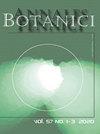越南减数榕科二新种——基于分子系统发育和形态的研究
IF 0.9
4区 生物学
Q4 PLANT SCIENCES
引用次数: 1
摘要
Meiogyne rubra Jaikhamseub,Damth。&对越南的Chaowasku sp.nova和M.vietnamica Jaikhamseub、T.A.Le和Chaowaskusp.nova(番荔枝科)进行了描述和说明。基于多达8个质体DNA区域(matK、ndhF、rbcL和ycf1外显子;trnL内含子;ndhF-rpl32、rpl32-trnL和trnL-trnF基因间间隔子)并结合33份Meiogyne材料(31种)进行了分子系统发育重建。这两个新物种,以及M.anomalocarpa、M.caudata、M.chiangraiensis和M.subssilis首次被纳入分子系统发育分析。在Meiogyne中检索到两个主要的分支:一个由M.anomalocarpa、M.hainanensis和M.kanthanensis组成的小分支,以及一个由其余材料组成的大得多的分支。这两个新物种在后一个分支中的系统发育位置尚不清楚。红色Meiogyne在形态上似乎与单精子M.monosperma最相似。前者与后者的不同之处在于叶片较窄,离生(与基部合生),萼片较长,外部花瓣较长,内部花瓣较大。越南雌核线虫在形态上与尾状茎线虫最相似,但与之不同的是,它有一个尖锐到渐尖(与通常明显的尾状渐尖相比)的叶尖,下叶表面的不突出(与突出相比)的次脉和叶片中数量较多的次脉。还提供了越南Meiogyne物种的一个关键。本文章由计算机程序翻译,如有差异,请以英文原文为准。
Two New Species of Meiogyne (Annonaceae) from Vietnam, Based on Molecular Phylogeny and Morphology
Meiogyne rubra Jaikhamseub, Damth. & Chaowasku sp. nova and M. vietnamica Jaikhamseub, T.A. Le & Chaowasku sp. nova (Annonaceae) from Vietnam are described and illustrated. Molecular phylogenetic reconstructions based on up to eight plastid DNA regions (matK, ndhF, rbcL and ycf1 exons; trnL intron; ndhF-rpl32, rpl32-trnL and trnL-trnF intergenic spacers) and incorporating 33 accessions (31 species) of Meiogyne were performed. The two new species, as well as M. anomalocarpa, M. caudata, M. chiangraiensis and M. subsessilis are included in molecular phylogenetic analyses for the first time. Two major clades were retrieved within Meiogyne: a small clade consisting of M. anomalocarpa, M. hainanensis and M. kanthanensis, and a much larger clade comprising the remaining accessions. The phylogenetic position of the two new species in the latter clade is obscure. Meiogyne rubra appears to be morphologically most similar to M. monosperma. The former differs from the latter by having a narrower leaf blade, free (vs. basally connate) and longer sepals, longer outer petals and larger inner petals. Meigyne vietnamica is morphologically most similar to M. caudata, but differs from it by having an acute to acuminate (vs. usually distinctly caudate-acuminate) leaf apex, non-prominent (vs. prominent) secondary veins on lower leaf surface and higher number of secondary veins in the leaves. A key to the species of Meiogyne in Vietnam is also provided.
求助全文
通过发布文献求助,成功后即可免费获取论文全文。
去求助
来源期刊

Annales Botanici Fennici
生物-植物科学
CiteScore
1.30
自引率
14.30%
发文量
38
审稿时长
6-12 weeks
期刊介绍:
The journal publishes original, previously unpublished papers on plant and fungal:
• systematics, evolution, phylogeography, taxonomy and nomenclature,
• population biology and genetics,
• physiology and molecular biology,
• terrestrial and aquatic ecology (including effects of climate change),
• ecology and reproduction of invasive species as well as their effects on native populations,
• phytogeography and paleoecology.
 求助内容:
求助内容: 应助结果提醒方式:
应助结果提醒方式:


